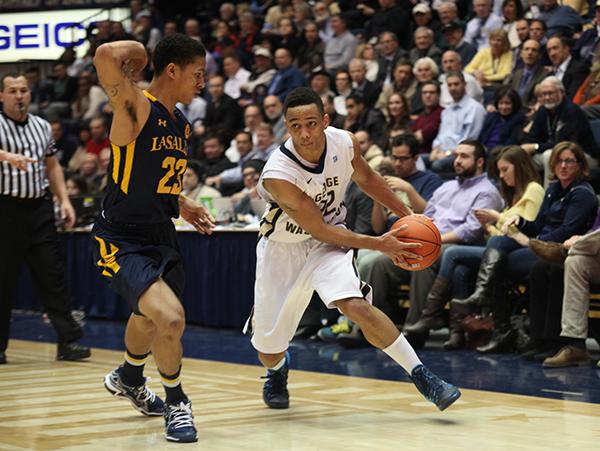Two weeks after the conclusion of his breakout sophomore season, guard Joe McDonald was in the hospital for hip surgery. And just after women’s basketball co-captain Megan Nipe’s career ended in the Women’s NIT Sweet 16, she had an operation to repair a torn ACL.
When athletes get hurt, who pays for their care?

At GW, athletes and their families use their own insurance, and the University picks up secondary coverage. Athletes with remaining expenses can also apply for aid from the NCAA’s Special Assistance Fund. GW decides how to distribute that money.
That’s a decent system. It’s better than some schools like Colgate and Oklahoma, where athletes who leave school are sometimes saddled with tens of thousands of dollars in out-of-pocket medical expenses. The NCAA mandates that every competing athlete has private insurance.
In his third year as athletic director, Patrick Nero told me he couldn’t recall any time an athlete had “specific needs” that GW couldn’t meet.
“The system, right now, is working,” he said.
However, the system does have its shortcomings. GW limits benefits to a period of two years after the injury date. For any injuries that require long-term medical treatment, players are on their own.
Health care is a key part of the debate over whether college athletes are students or workers. Football players at Northwestern University most recently stirred that debate with their push for unionization. The dispute isn’t just about athletes who want more perks to go along with their “free” education.
If an athlete suffers an injury during an athletic contest in which ticket sales benefit the NCAA and GW, the unpaid college student and his or her family should not be responsible for medical expenses. It doesn’t matter if the expenses are covered by insurance (but hikes up future costs), or comes out of their pockets right away.
The NCAA, a financial powerhouse that raked in more than $913 million last year, shouldn’t be a last resort when it comes to paying for the injuries of Division I athletes, who are, essentially, their employees. They should be the first line of defense, the first checks cashed.
Of the about $498 million the NCAA distributed to Division I schools this year, only about 2 percent was used for health and safety expenses as a part of the Student Assistance Fund, according to the Division I revenue distribution plan.

Athletes take risks when they play sports, and the NCAA gains financially on their backs. The NCAA, a typically slow-moving institution, must take steps now to reform itself.
The NCAA can take inspiration from its own legislative council, which decided Tuesday to allow Division I schools to provide their scholarship and walk-on athletes “unlimited meals and snacks.”
Previously, athletes had to have the same meal plan as all other students. This requirement hurt athletes at GW, where Dining Dollars and Colonial Cash can dwindle when athletes inevitably consume more calories than the average student.
Nero lobbied the NCAA to change the old rule. “There is no real logical reason for the NCAA to limit what a university feels is a necessary nutritional plan for its student athletes,” he said.
This policy change, and Nero’s central role in advocating for it, could be a good omen for changing the health care policy for athletes both at GW and across the NCAA.
“I think from an NCAA standpoint, it’s more about, ‘Right now, are enough financial resources going from the NCAA national office to campuses to make sure that the student athletes’ needs are being met?’” Nero said. “I can see that conversation continuing.”
Athletes don’t just need to eat well on campus. They sacrifice their health – sometimes secretly, as Nipe did – and need protection long after their careers end.
Ben Krimmel, a senior majoring in international affairs, is a Hatchet columnist.





